Key takeaways:
- Resilience in children involves adapting to challenges and developing coping strategies, which can be nurtured through supportive relationships and a positive mindset.
- Teaching problem-solving skills and emotional intelligence empowers children to navigate setbacks, fostering their confidence and resilience.
- Encouraging social connections and group activities helps children build empathy and a sense of belonging, which are crucial for their emotional growth.
- Personal experiences and reflections on challenges reinforce the importance of allowing children to face difficulties and learn from them independently.
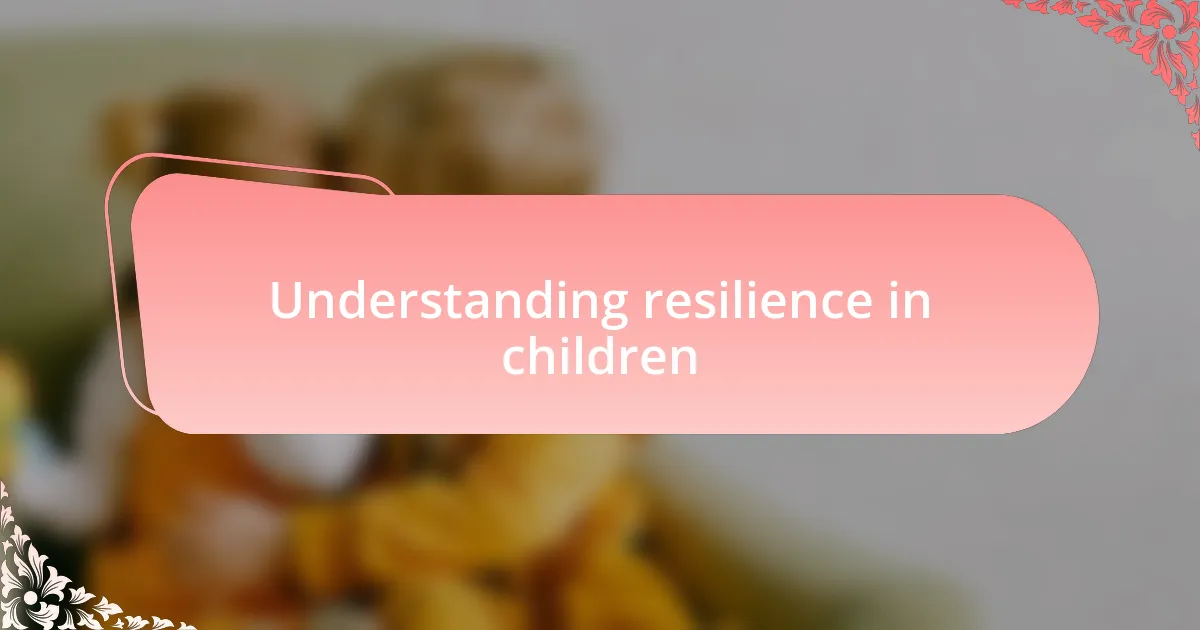
Understanding resilience in children
Resilience in children is their ability to adapt and bounce back from challenges. I remember a time when my niece faced a tough transition after moving to a new school. Instead of breaking down, she explored new friendships and embraced her surroundings, which illustrated her inherent resilience.
Understanding resilience isn’t just about overcoming adversity; it’s also about developing coping strategies for everyday stresses. Have you noticed how some kids handle disappointment differently? I’ve seen children who view setbacks as opportunities for growth, which highlights the importance of nurturing a positive mindset from an early age.
Moreover, resilience can be cultivated through supportive relationships, whether with family, friends, or mentors. For instance, I’ve watched a friend’s son become more resilient due to the unwavering support from his parents during challenging times. It’s fascinating to see how a safe and encouraging environment lays the groundwork for children to thrive, even when the going gets tough.
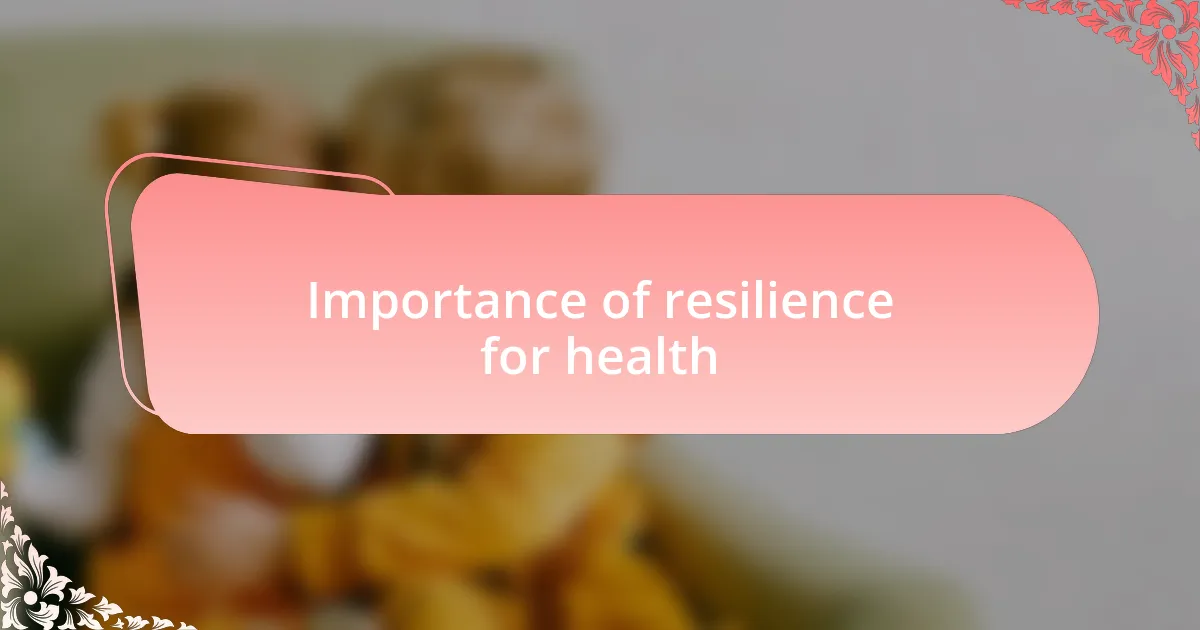
Importance of resilience for health
Resilience plays a crucial role in overall health because it helps children manage stress effectively. I recall a situation when my nephew faced difficulties with a sports team; instead of feeling defeated, he learned to focus on what he could improve. This approach not only boosted his confidence but also taught him how to handle pressure, underscoring the idea that resilience can lead to better emotional and physical health.
Without resilience, children may struggle with anxiety and depression, impacting both their wellbeing and development. I’ve seen kids who lack these coping skills become overwhelmed by minor setbacks, which can lead to a cascade of health issues. It makes me wonder—how many children have the potential to thrive if they learn to embrace challenges instead of retreating from them?
Additionally, resilient children are often more inclined to develop healthy relationships, both socially and emotionally. A close friend’s daughter once mentioned how her ability to bounce back from friendship conflicts helped her forge stronger connections, demonstrating that resilience doesn’t just nurture individuals but fosters a supportive community. That realization made me think: isn’t building resilience one of the greatest gifts we can give our children?
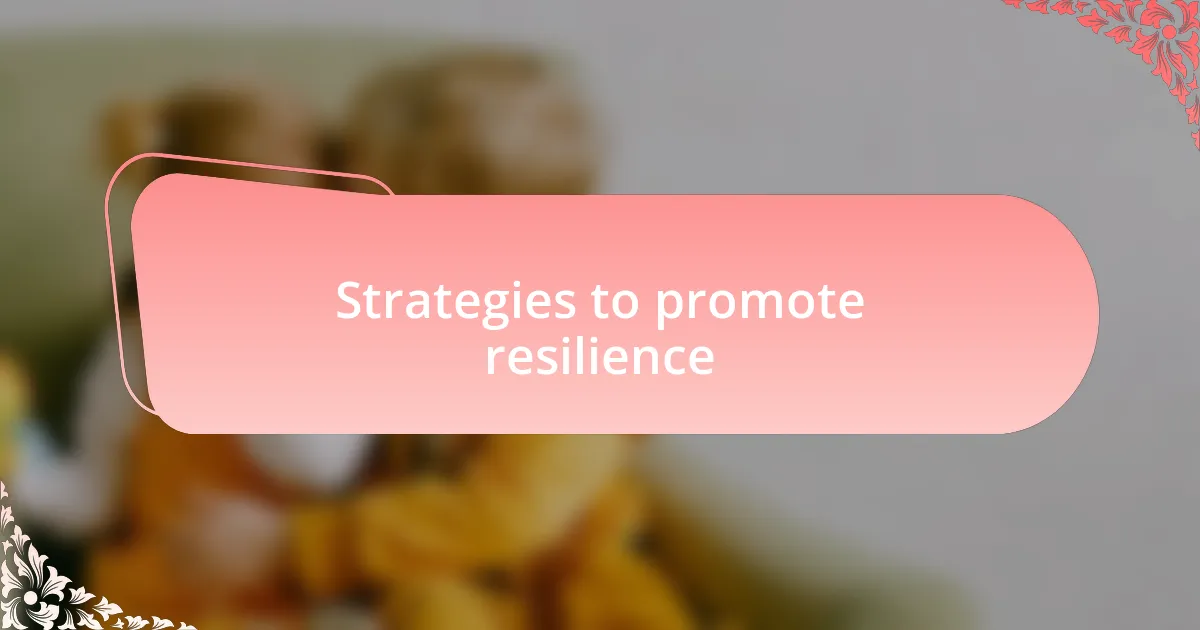
Strategies to promote resilience
Strategies to promote resilience can take various forms, and one effective method is to encourage children to take risks in a safe environment. I remember a time when my daughter tried out for a school play despite her fear of performing in front of an audience. When she didn’t get a part, instead of sulking, we talked about what she could do differently next time. This small nudge not only helped her process disappointment but also empowered her to keep pursuing her goals. Isn’t it interesting how taking small risks can build a child’s confidence over time?
Another strategy is to model resilience ourselves as adults. I often share my own challenges with my children, whether it’s a work challenge or a personal goal I’ve struggled to achieve. By being open about my setbacks, I aim to show them that failure is not the end but merely a part of the journey. This transparency creates a family culture where it’s okay to fall short sometimes and to learn from those experiences. How powerful is that, to foster an atmosphere of growth and understanding?
Creating consistent routines can also bolster resilience in children. When children know what to expect daily, they develop a sense of security that allows them to handle unexpected changes more effectively. I’ve observed that my niece thrives when her day includes a mix of play, chores, and downtime. This blend not only keeps her grounded but also equips her to face challenges with a clear mind. Doesn’t it make you think about how structure can actually enhance flexibility in a child’s coping strategies?
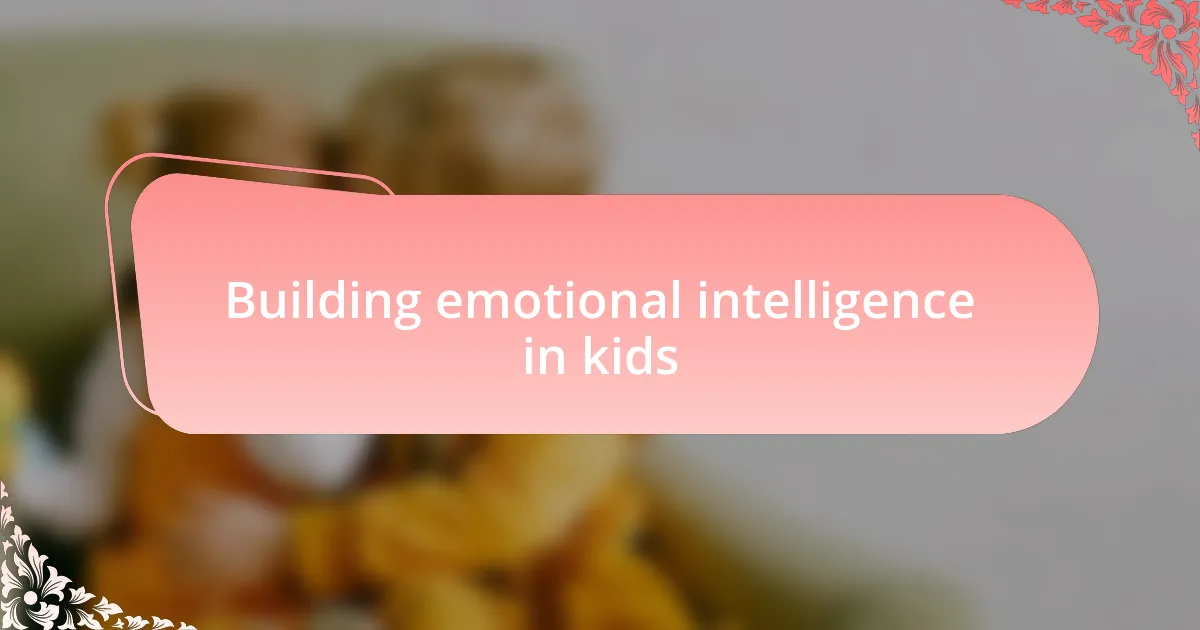
Building emotional intelligence in kids
One key aspect of building emotional intelligence in kids is teaching them to recognize and name their feelings. I recall a moment when my son came home upset after a disagreement with his friend. Instead of dismissing his feelings, I prompted him to articulate exactly how he felt and why. This not only validated his emotions but also helped him understand that it was okay to feel sad or angry. Isn’t it remarkable how simply putting feelings into words can empower a child to process and express themselves better?
Encouraging empathy is another vital piece of the puzzle. I often engage my daughter in discussions about how her actions affect others. Once, after we read a story about a character facing bullying, we explored how she would feel in that situation. This kind of dialogue fosters a deeper understanding of interpersonal dynamics and strengthens her ability to relate to her peers. Don’t you find it fascinating how these conversations can shape a child’s capacity for compassion?
Lastly, teaching problem-solving skills can significantly enhance a child’s emotional intelligence. I remember a time when my daughter was frustrated with a puzzling problem for school. Rather than stepping in to solve it for her, I guided her through the process of breaking it down into smaller parts. That struggle turned into a valuable lesson in perseverance, and in the end, she not only solved the problem but also built confidence in her ability to tackle challenges. Isn’t it astonishing how these small teaching moments can have such lasting impacts on a child’s emotional growth?
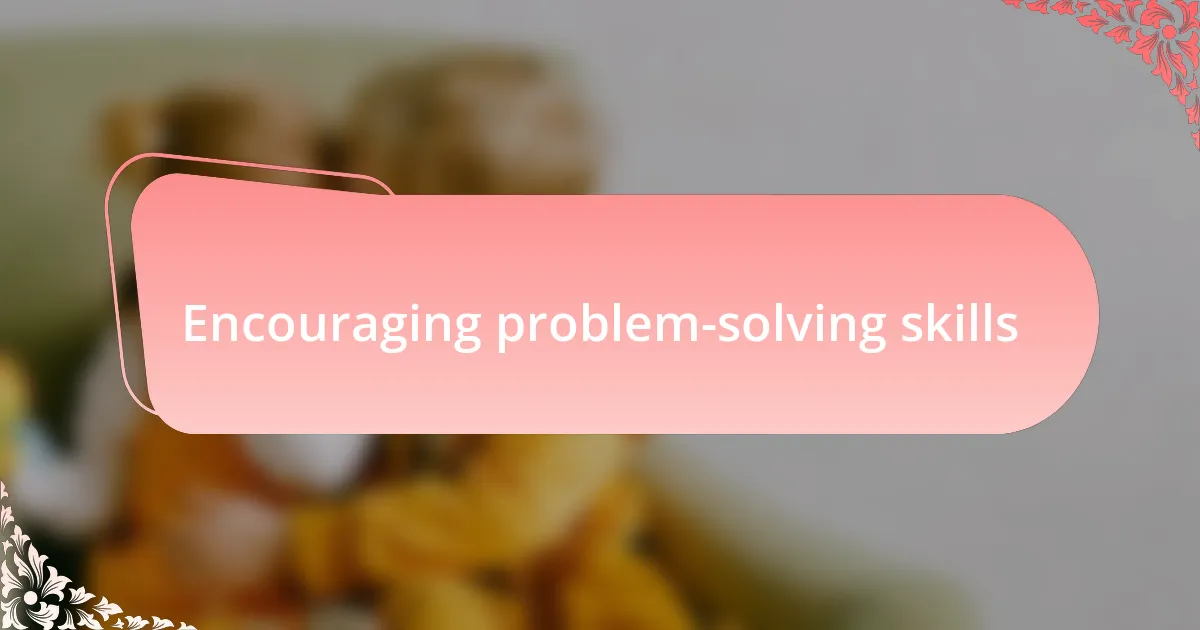
Encouraging problem-solving skills
I often find that providing opportunities for children to tackle challenges on their own can be incredibly rewarding. For instance, the other day, my son faced a tricky task of organizing his room. Instead of doing it for him, I suggested he create a simple plan with step-by-step instructions. Watching him strategize and ultimately take ownership of the process was not just satisfying for him; it reinforced his confidence in his ability to solve problems and build resilience.
Sometimes, framing problems as puzzles can make a significant difference in how kids approach them. I remember a family game night when my daughter navigated through a particularly tough board game. When she found herself in a bind, instead of giving up, I encouraged her to think of alternative moves. That moment ignited a spark in her; she learned that sometimes stepping back and reevaluating a situation can reveal new solutions. Have you noticed how giving children the space to explore different perspectives can nurture a resilient mindset?
Additionally, I believe that collaboration fosters problem-solving skills remarkably well. Just the other week, my kids and I worked together to bake cookies. When we ran out of sugar, instead of being deterred, we brainstormed substitutes and ended up creating a unique recipe. This experience was not only fun; it illustrated the power of teamwork and adaptability. Isn’t it fascinating how collaborative problem-solving can deepen a child’s resourcefulness and strengthen their resilience?
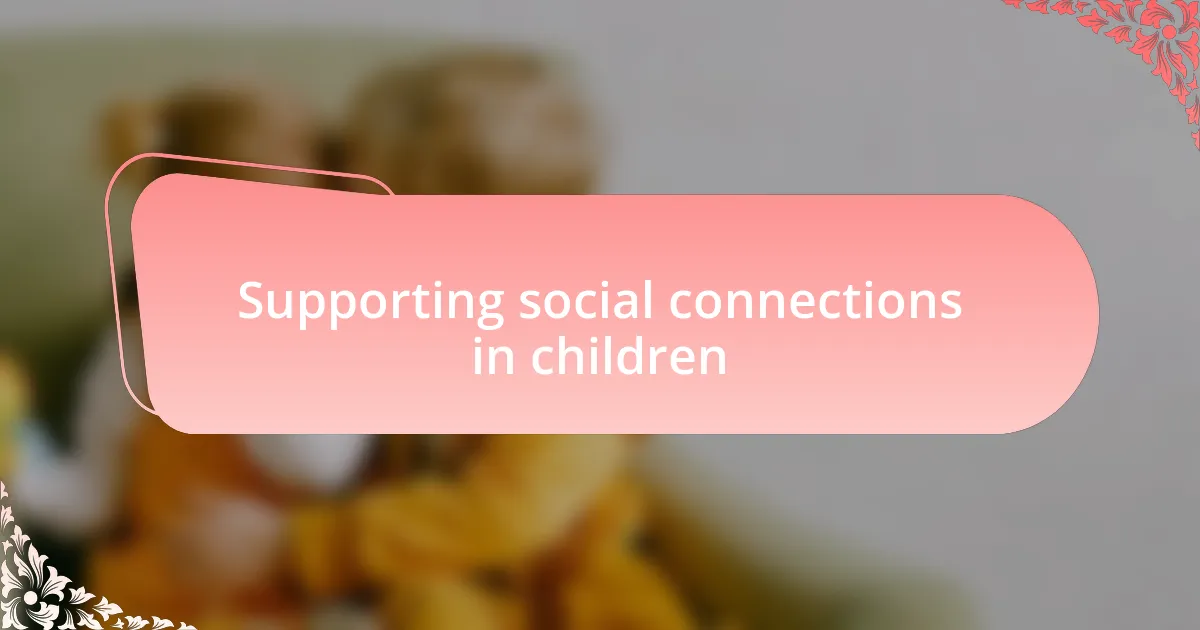
Supporting social connections in children
Supporting social connections in children is fundamental for their overall development. I remember organizing a simple neighborhood playdate for my daughter and her friends. Watching them laugh and share stories reminded me of the importance of these friendships; it’s in those moments that they learn empathy, cooperation, and how to navigate social dynamics.
As I observed my son join a local sports team, I was amazed at how quickly he bonded with his teammates. The shared experience of training and competing created a sense of belonging that nurtured his self-esteem. Have you noticed how these connections can act as a support system, allowing kids to feel more secure and confident in themselves?
Encouraging children to engage in group activities can be incredibly beneficial. Just last week, I saw my daughter take the lead in a group project at school, guiding her classmates with enthusiasm. It struck me that these opportunities not only enhance their social skills but also contribute to their resilience. Isn’t it uplifting to realize that the friendships they forge today can lay the groundwork for a lifetime of support?
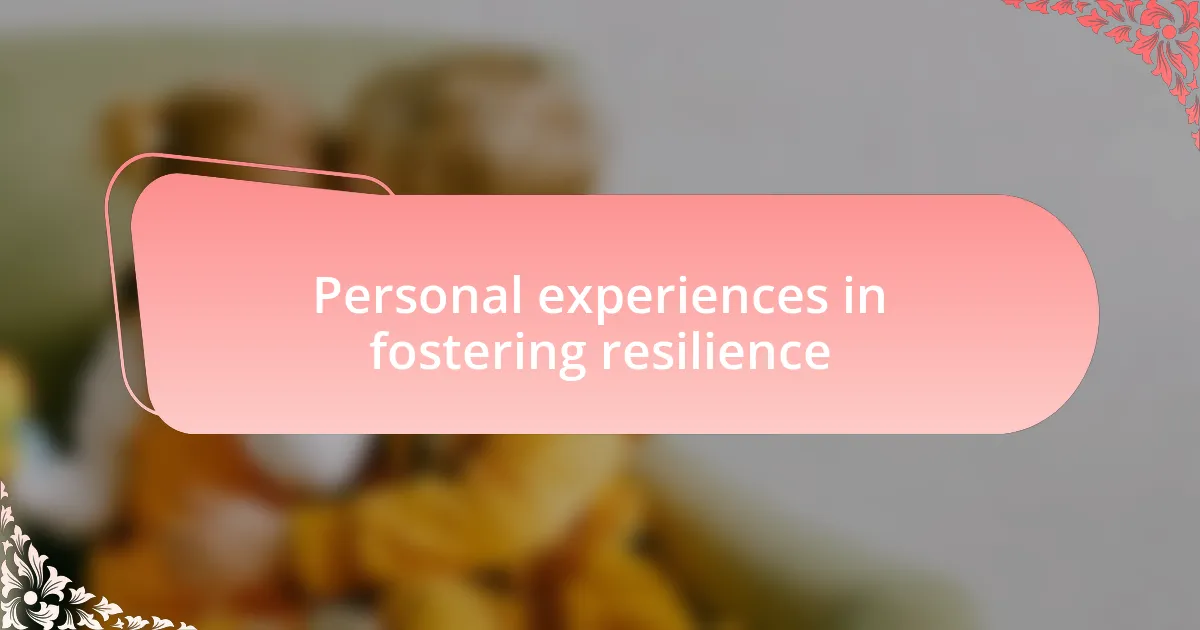
Personal experiences in fostering resilience
I remember a time when my daughter faced disappointment after losing a school competition. I encouraged her to express her feelings, and we discussed what she could learn from the experience. Watching her process her emotions and eventually bounce back taught me just how vital it is for children to know that setbacks are part of growth. Have you ever noticed how a simple conversation can help kids see a different perspective?
There was another instance with my son when he struggled with a challenging math problem. Instead of offering immediate solutions, I stayed silent, allowing him to wrestle with the problem. Eventually, he figured it out on his own, and the pride in his eyes was unforgettable. I realized that fostering resilience often means giving our children the space to solve their challenges independently. Do you think allowing children to struggle a little can actually make them stronger in the long run?
One summer, we decided to go on a family hiking trip, despite the unpredictable weather. The day turned into a rainy adventure that seemed frustrating at first, but as we shared laughter while navigating slippery paths, I saw my children growing closer. They learned to adapt and find joy in unexpected situations—valuable lessons in resilience. Isn’t it fascinating how sometimes, the most memorable experiences happen when things don’t go as planned?